|
The
Gurmat Sangeet Project |
|
Dedicated
to the Preservation & Propagation of Gurmat Sangeet |
|
Third
Annual Gurmat Sangeet Darbar
Millis Gurdwara Sahib, December 31 2007
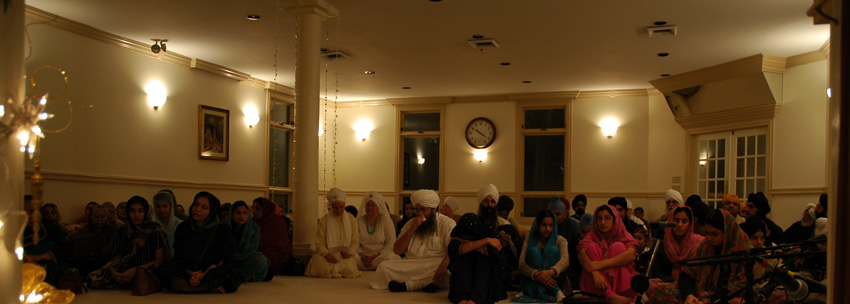
The 2007 Gurmat Sangeet Darbar at Millis
The tradition of Gurmat Sangeet has been evolving from the times of the Gurus to the present. Historically this has largely been an oral tradition, which has been handed from generation to generation often from father to son in families that have been associated with Gurmat Sangeet since the times of the Gurus. The absence of a written tradition and the lack of a consistent framework for the documentation and preservation of Gurmat Sangeet has had a devastating effect, as this centuries-old system for the transmission of the tradition has broken down under the pressures of the modern world.
Fortunately, at the turn of the century, a system for musical notation invented by Pandit Vishnu Narain Bhatkhande was adopted for use by S. Gian Singh Abbotabad, who under the auspices of the SGPC, produced two volumes titled Gurbani Sangeet in 1961. These volumes represented the first notable effort to document centuries old compositions that define Gurmat Sangeet and preserve them for posterity. This work was followed by other notable works by Bhai Avtar Singh and Bhai Gurcharan Singh as well as Gyani Dyal Singh of the Rakab Ganj Kirtan Vidyalay.
Despite these excellent efforts, Gurmat Sangeet suffered the onslaught of ‘modernization’, driven largely by the lure of popularity and financial gain, particularly in the last four decades. Ragis increasingly switched to popular tunes which required less effort and could be plagiarized from readily available sources such as film music, discovering that pandering to popular taste was often the shortest path to popularity and riches. The problem was exacerbated by the ready availability of very cheap mass marketed recordings, which further strengthened the grip of the banal form of Kirtan to the detriment of the Gurmat Sangeet tradition.
In recent times, particularly in the Sikh Diaspora, we have been fortunate to witness a reanissance of sorts, where young Sikhs in particular are beginning to show interest in understanding and preserving the traditions of Gurmat Sangeet.
This humble effort is dedicated to the preservation and propogation of traditional Gurmat Sangeet. The intent is to honor and recognize Kirtaniyas who have dedicated their lives to the preservation of the tradition. Another goal is to encourage young Kirtaniyas who have attempted to preserve the tradition and to present them to the Sangat at large, in the process, creating archival material that is truly reflective of the rich traditions of Gurmat Sangeet.
The Third Annnual Gurmat Sangeet Darbar was held at the Millis Gurdwara Sahib, in the Boston area on December 31, 2007 This page contains recordings and pictures from the Darbar.
| Shabad |
Singer | Raga |
| Kawal nayn madhur bayn | Shraddha Agrawal | Bageshri |
| Sajjan mainde naal hou dhundaynde sajjana | Shraddha Agrawal | Darbari Kanada |
| Hinadi jaat meri jaadam raya | Bhai Gupal Singh | Kamod |
| Kou hai mero sajan meet | Bhai Gupal Singh | Partaal : Chhayanat |
| Shyam sundar tajj neend kyon aaye | Bhai Gupal Singh | Shivranjani |
| Sadhu har hare gun gaye | Bhai Nitendar Singh | Darbari Kanada |
| Satgur chaatoon pagg chaat | Bhai Nitendar Singh | Guldasta : Darbari, Malkauns, Tilang, Durga |
| Gobind preet laagi att pyari | Harbhajan Kaur, Sri Sevak Kaur | |
| Sachi preet ham tum sio jodi | Harbhajan Kaur, Sri Sevak Kaur | |
| Ram bhaj ram bhaj janam siraat hai | Amrit Kaur Mehr Kaur | Guldasta Jaijawanti, Des, Tilak Kamod, Khamaj, Tilang, Rageshwari |
| Tuhi tuhi tuhi tuhi | Amrit Kaur Mehr Kaur | Bhairavi |
| Mate matang jare jur sang | Simranjit & Vijayant Singh | Malkauns |
| As kirpan khando khadag | Simrn Kaur Gurleen Kaur | Malkauns |
Shraddha Agrawal
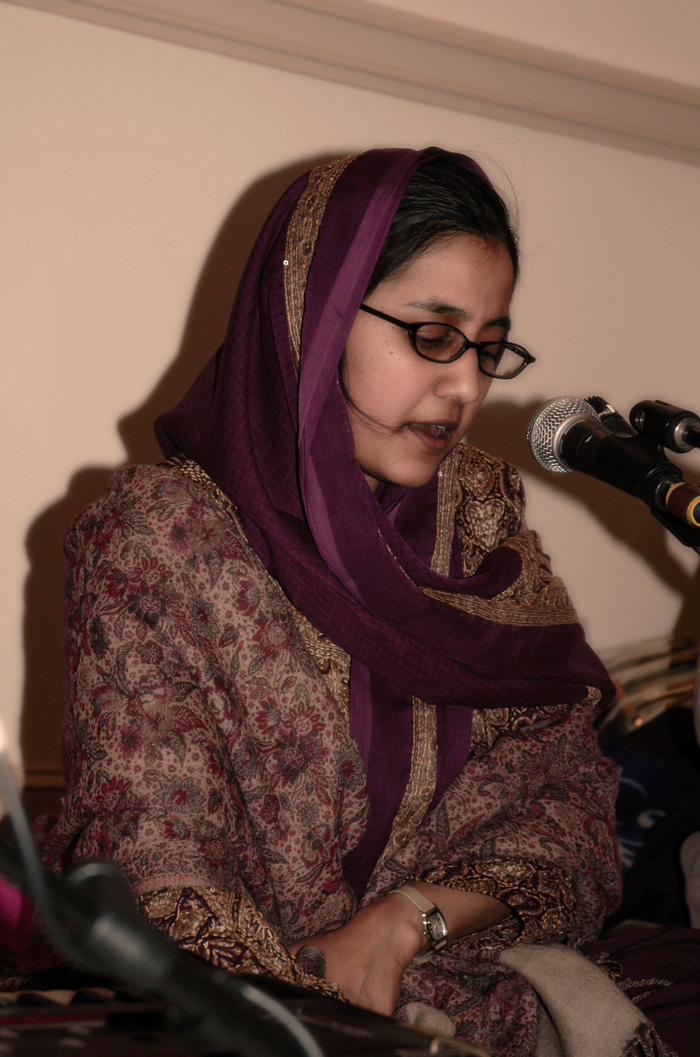
Shraddha Agrawal is a classical vocalist,
originally from Bombay. For the last three years, she has been studying
with Ms. Kumkum Sanyal, a prominent Boston area teacher. She has performed
at many venues in the Boston area. Shraddha is also a fine harmonium player
and has accompanied several artistes in Boston area concerts. Shraddha
put in a lot of effort into teaching herself traditional Gurmat Sangeet
compositions to present to the Sangat during this program.
Shradddha began by singing ‘Kawal Nayn Madhur Bayn’ in Raag
Bageshwari. This is an ancient Gurmat Sangeet composition in the Dhrupad
style, set to slow Chartaal, a cycle of 12 beats. The late Bhai Avtar
Singh Ji used to sing this composition often and it can be found in his
book on Gurmat Sangeet, Prachin Reet Ratnavali.
The second shabad that Shraddha sang was a Slok in Raga Kanada by Sri
Gur Ramndas Sahib. This too is an ancient Gurmat Sangeet composition in
Raga Darbari Kanada. This composition can be found in Gyani Dyal Singh
Ji’s Gurmat Sangeet Sagar, Volume 2, as well as other texts.
Bhai Gupal Singh
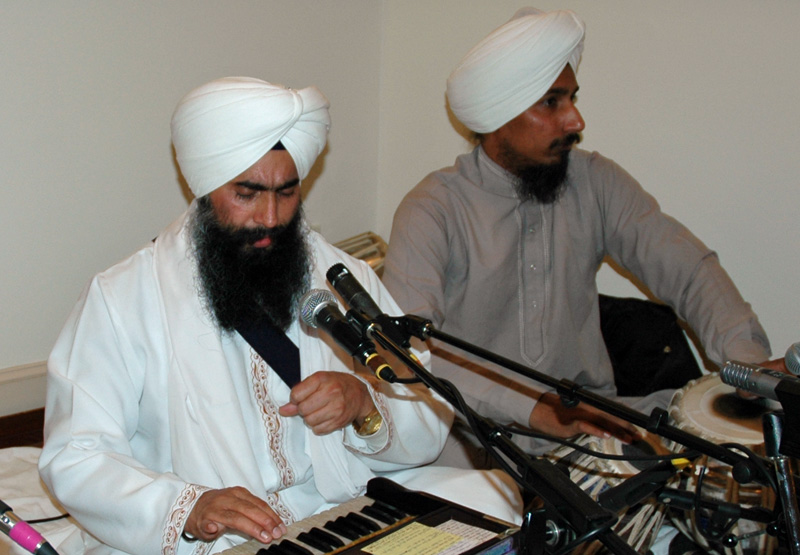
Bhai Gupal Singh is the Huzoori Ragi at the Milford
Gurdwara Sahib.. Bhai Gupal Singh is a senior student of Gyani Dyal Singh
Ji's and has also studied Gurmat Sangeet at Rakab Ganj.
Bhai Gupal singh started by singing 'Hinadi jaat meri jaadam raiya' in
Raga Kamod, et to medium tempo Jhaptaal. This is a Puratan Gurmat Sangeet
compsition that can be found in Gurmat Sangeet Sagar, Volume 2.
The second shabad was a Partaal in Raga Chhayanat, 'Kou hai mero saajan meet'. This too is a Puratan Gurmat Sangeet compsition that can be found in Gurmat Sangeet Sagar, Volume 2. The sthai is in medium tempo Iktaal followed by antras in Tintaal and Roopak.
The final shabad was a beautiful reet in Raga Shivranjani, set to Keherwa, of of Gyani Dyal Singh Ji's favorite compositions.
Bhai Nitender Singh accompanied by Bhai Sarbjit Singh (tabla) and Bhai Ranvir Singh (vocals)
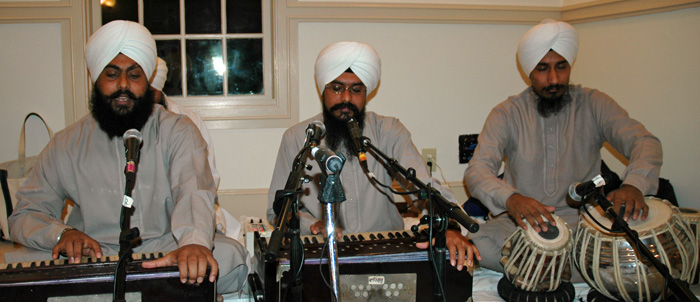
Bhai Nitender Singh, Bhai Sarbjit Singh and Bhai Ranvir Singh are all students of Gyani Dyal Singh Ji and have trained at the Rakab Ganj Kirtan School in Delhi. They have spent many years studying traditional Gurmat Snageet and are visiting from Bombay.
The Jatha started by singing the shabad 'Sadhu har hare gun gaye' a Puratan composition in Raga Darbari Kanada, set to Tintaal.
The second shabad was an original composition by Gyani Dyal Singh Ji, a Guldasta that begins in Darbari Kanada with the shtai set to Panj Taal Di Savaari, a complex cycle of 15 beats. The melody then transitions to Malkauns in Roopak, a 7 beat tala, at twice the tempo of the sthai. The next antra is set to Raga Bageshri in Tintaal, 16 beeat tala, at four times the tempo of the sthai. The next antra is in Raga Tilang, set to Soolfaak (10 beats). The final antra is in Raga Durga and is set to Iktaal (12 beats)
Jagan Nath Singh, Sri Sevak Kaur, Harbhajan Kaur, Sarbjit Singh
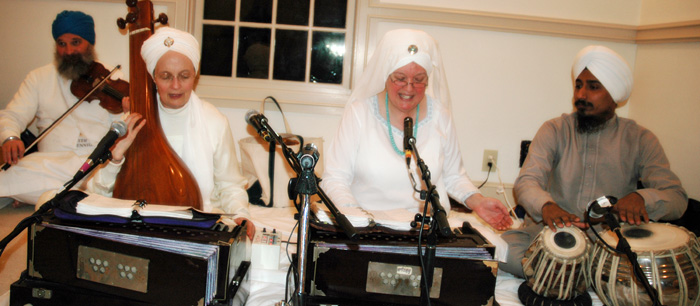
Harbhajan Kaur and Sri Sevak Kaur are both students of the noted Sikh musician Baldeep Singh. Jagan Nath Singh is a talented Classicial Violinist, who takes great pleasure in accompanying practitioners of Gurmat Sangeet.
The Gurmat Sangeet Project, Boston Chapter
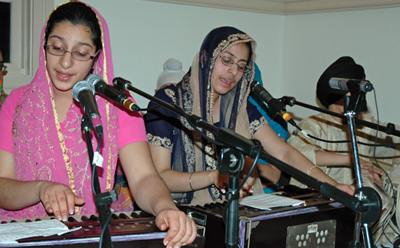 |
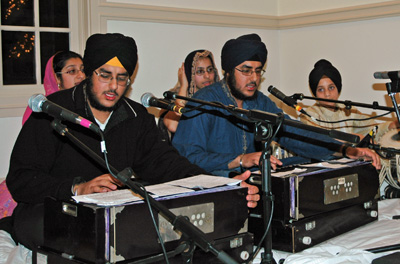 |
Mehr Kaur, Amrit Kaur, Jaspreet Singh |
Simranjit Singh, Vijayant Singh, Jaspreet Singh |
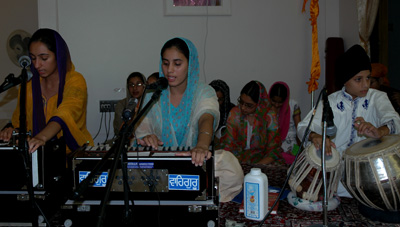 |
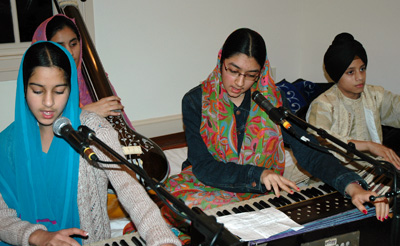 |
Gurleen Kaur, Simran Kaur, Jaspreet Singh |
Baljot Kaur, Avneet Kaur, Jaspreet Singh |
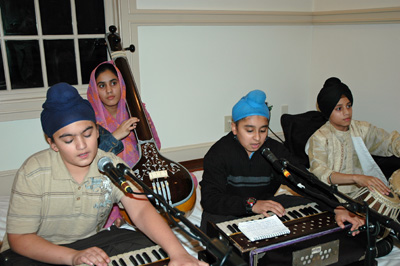 |
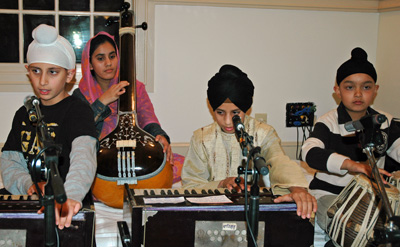 |
Gurtaj, Deepinder & Jaspreet Singh; Simran
Kaur (tanpura) |
Amandeep Singh, Jaspreet Singh, Angad Singh |
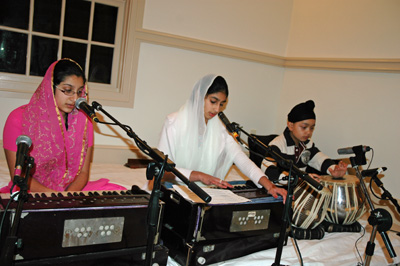 |
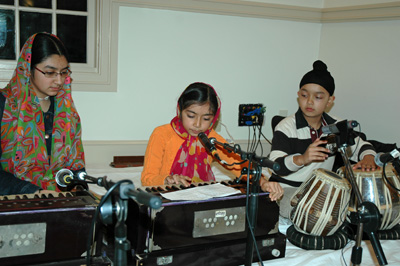 |
Mehr Kaur, Simran Kaur, Angad Singh |
Avneet Kaur, Simran Kaur, Angad Singh |
The Gurmat Sangeet Project, from its humble beginnings in the Boston Area in 2002 has developed into one of the premier organizations dedicated to the preservation and propagation of Gurmat Sangeet in the Panth today. It has a huge repository of Gurmat Sangeet renditions, all recorded in the presece of the Guru Granth Sahib and all available freely for download. It also has extensive teaching materials for the study of Gurmat Sangeet. Lovers of Gurmat Sangeet from all over the world have been generously contributing recordings to constsantly enhance its collection. The Gurmnat Sngeet Project Jatha, through its decidcation towards learning and preserving the Guru's musical tradition, is the embodiment of the organization's aspirations.
Gurleen Kaur and Simran Kaur began by
singing the shabad ‘As Kirpan Khando Khadag’ in Raga Malkauns,
set to Ik taal. This is a modern composition that has been inspired by
traditional Gurmat Sangeet compositions.
Simranjit Singh and Vijayant Singh then sang ‘Mate
Matang Jare Jur Sang’, from the Tav Prasad Sawaiye. This composition
is in the traditional Partaal format, where each stanza of the shabad
is set to a different taal or rhythmic cycle. The composition is in Raga
Malkauns and begins in slow Dhamar, a dhrupad taal of 14 beats. The composition
then transitions to Iktaal (12 beats) Roopak (7 beats) and Tintaal (16
beats). The Partaal form is unique to Gurmat Sangeet and was first introduced
by Sri Guru Rammdas Sahib.
Amrit Kaur and Mehr Kaur had prepared ‘Ram bhaj
Ram bhaj janam siraat hai’, but were unable to present it to the
Sangat because the program ran alittle late. The recording was made in
an earlier Diwan. This shabad was revealed to Sri Guru Tegh Bahadur Sahib
in Raga Jaijawanti, the last Raga in the Sri Guru Granth Sahib. The composition
is ion the form called ‘Guldasta’ which literally means :
bouquet. The composition begins in slow Dhamar in Raga Jaijawanti. It
then transitions to different talas or rhythmic cycles as well as different
Ragas. Raga Jaijawanti is from the Khamaj Thaat or parent scale. The composition
includes various Ragas from the Khamaj scale such as Des, Tilak Kamod,
Khamaj, Tilang, Kalavati and Rageshwari. The Talas used are Iktaal, Punjabi
Theka (16 beats), Soolfak, Dipchandi (14 beats) and Tintaal.
The Jatha concluded by singing ‘Tuhi Tuhi Tuhi Tuhi’ a shabad
drawn from Sri Guru Gobind Singh Ji’s Akal Ustat, written in praise
of Waheguru.
| Shabad |
Singer | Raga |
| Main banjaran ram ki | Avneet Kaur Baljot Kaur | Bhupali |
| Ek rati bin ek rati ke | Amandeep & Jaspreet Singh | Bhupali |
| Kahe re ban khohan jayi | Gurtaj & Deepinder Singh | Dhanasri |
| Mere lalan ki sobha | Simran Kaur | Yaman Kalyan |
| Charan kamal prabh ke nit dhiavoh | Simran (Sima) Kaur | Bilaval |